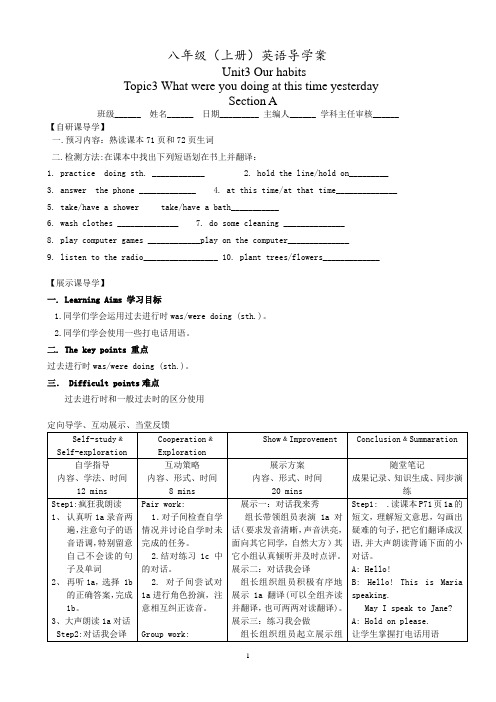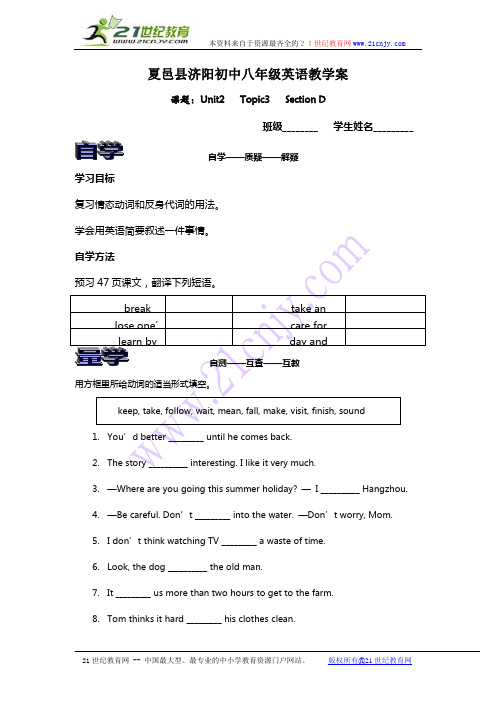新版八年级英语上册Unit3 Topic3 Section D导学案
- 格式:docx
- 大小:18.95 KB
- 文档页数:4

八上Unit3 Topic3 Section C What were you doing at this time yesterday? 学案Name:____________Section CThe little Match girl卖火柴的小女孩1. It was snowy and ________(黑暗的) on a new year’s Eve. 在一个又下雪又黑的除夕夜。
2. Many people were _______________________(团聚) in their warm homes. 很多人团聚在他们温暖的家里。
3. A poor little girl was ________(仍然) walking in the streets with no shoes. 一个可怜的小女孩仍然光着脚走在大街上。
4. There were some __________(match) in her hand. 她的手里有一些火柴。
★哭,喊,叫n.& v._________ [过去式__________] 低声地说____________________________5. “Matches, matches!” the little girl cried _____ a low voice. “卖火柴,卖火柴!”小女孩低声地哭诉着。
★听见,听到v._________ [过去式__________] pass by“经过”6. No one __________(hear) her when they were passing by. 路过的人们没有听到她的声音。
7. She didn’t __________(卖) any matches and no one gave her a __________(硬币).她一根火柴也没卖出去,也没有人给她一个硬币。
8. The wind blows ____________(strong). 风刮得很大/强烈。

仁爱八年级上Unit3 Topic3 SectionB 导学案设计人: 赵爱琴备课组长:杨振娟审核人:连俊伟学习目标:1.掌握Page71-72的单词,重点短语及句型。
2.自学理解文章内容。
3.通过合作探究,熟练掌握和运用下列短语、句型。
agree with sb.同意某人(的话或看法)so handsome真帅be angry with sb.生某人的气make faces做鬼脸make sb. do sth.让某人做某事make sb./sth. +adj.使某人/物…nothing serious 没什么严重的What was he/she/… doing? 他/她/…在做什么?What were you doing? 你在做什么?I agree.=I think so. 我同意I don’t agree.= I don’t think so. 我不同意it is pleasant to do sth. 做…很愉快Don’t do that again.别再做那事了自学引导:1.自学P71-72的单词。
(根据音标拼读,拼写并牢记)2.预习Section B为课堂展示作准备。
3.标出重要的短语和句型,疑难点,准备课堂中讨论解决。
预习自测:I. 词汇(A) 选择正确汉译英:( ) 1. 古典音乐A:Rock music( ) 2. 摇滚音乐B:Classical music( ) 3. 民间音乐C:Folk music( ) 4. 乡村音乐D:Jazz( ) 5. 爵士乐E:Country music(B) 根据句意及汉语提示写出单词,并用其适当形式填空。
6. __________(收集)stamps is my favorite hobby.7. He often makes us __________(笑) in class.8. I was __________(浇)the flowers when my mother came back yesterday.9. Doing exercise can bring us happiness and __________(放松)。

八年级(上册)英语导学案Unit3 Our habitsTopic3 What were you doing at this time yesterdaySection A班级______ 姓名______ 日期_________ 主编人______ 学科主任审核______ 【自研课导学】一.预习内容:熟读课本71页和72页生词二.检测方法:在课本中找出下列短语划在书上并翻译:1. practice doing sth. ____________2. hold the line/hold on_________3. answer the phone _____________4. at this time/at that time______________5. take/have a shower take/have a bath___________6. wash clothes ______________7. do some cleaning ______________8. play computer games ____________play on the computer______________9. listen to the radio_________________ 10. plant trees/flowers_____________【展示课导学】一. Learning Aims学习目标1.同学们学会运用过去进行时was/were doing (sth.)。
2.同学们学会使用一些打电话用语。
二. The key points 重点过去进行时was/were doing (sth.)。
三. Difficult points难点过去进行时和一般过去时的区分使用定向导学、互动展示、当堂反馈自我评价:对子互评:组内等级评定:____________当堂检测一.用所给单词填空:1. It was eight o’clock. The Smiths __________ __________ (watch) a movie.2. They __________ ____________ (shop) when you met them.3. The twins _________ ____________ (dance) under the tree when I saw them.二.单项选择。

Unit3 Topic3 教学设计SectionAⅠ. Material analysisSection A的主要教学活动为1a和3。
本节课主要是通过Maria和Jane打电话的图片,引导学生复习电话用语和正在进行时,从而引出本课的语法点过去进行时。
在现在进行时的基础之上学习过去进行时,可以为学生的学习打下良好的基础。
本节课所要呈现的内容有关学生的日常生活如:吃饭、睡觉、看书、学习等。
老师们可以根据教学内容,设计模拟真实的情景,让学生在真实情景中习得语言。
但是要熟练、正确地使用过去进行时,并能在实际生活中学会用过去进行时谈论所做的事情还是有一定的难度,要求老师们不断创新,尽量将自己的课堂融入到生活之中。
Ⅱ. Teaching aimsKnowledge aims:1. 能够根据音标正确拼读answer, shower, serve, news, museum等。
2. 能根据音标书写以下单词:answer, shower, serve, news, museum和一些有关日常行为的短语如:chat with friends, listen to等。
3. 能正确熟练地运用be+doing, 初步学习was/were+doing的用法。
4. 能运用本课所学语言,就过去或现在正在做的事情进行正确的描述。
Skill aims:1. 能听懂有关谈论过去和现在所做的事情,听懂电话用语。
2. 能正确地使用电话用语,并能在生活中自由谈论自己和他人过去某一时间正在做的事情。
3. 能正确朗读课本的文本材料,读懂介绍某个时段在做什么的文章。
4. 能用过去进行时正确描绘、书写自己某一天所做的事情。
Emotional aims:培养学生养成尽量多地使用英语表达自己的意思的习惯,将精力和注意力主要放在意思的表达上,明白语言的交际功能。
Ⅲ. The key points and difficult pointsKey points:1. 熟练使用电话用语。

夏邑县济阳初中八年级英语教学案课题:Unit2 Topic3 Section D班级________ 学生姓名_________自学——质疑——解疑学习目标复习情态动词和反身代词的用法。
学会用英语简要叙述一件事情。
自学方法 预习47页课文,翻译下列短语。
break outtake an active part in lose one ’s life care for learn byoneself day and night自测——互查——互教 用方框里所给动词的适当形式填空。
keep, take, follow, wait, mean, fall, make, visit, finish, sound1. You ’d better _________ until he comes back.2. The story __________ interesting. I like it very much.3. —Where are you going this summer holiday? — I __________ Hangzhou.4. —Be careful. Don ’t _________ into the water. —Don ’t worry, Mom.5. I don ’t think watching TV _________ a waste of time.6. Look, the dog __________ the old man.7. It _________ us more than two hours to get to the farm.8. Tom thinks it hard _________ his clothes clean.9. You may go to the cinema, but you must _________ your homework first.10. —When shall we leave?—Let ’s __________ it half past seven in the morning.展示——反馈——导学【知识点击】1. In 2003, SARS, a kind of serious disease, broke out in China. 2003年,一种严重的疾病—SARS 袭击了中国。

八年级英语上Unit 3 Our Hobbies Topic3 Section D教案教学反思教学设计各位读友大家好,此文档由网络收集而来,欢迎您下载,谢谢仁爱版八年级上Unit3Topic3whatwereyoudoingatthistimey esterday?SectionD教学设计Themainactivitiesare1和5.本课重点活动是1和5。
Ⅰ.Teachingaimsanddemands教学目标:dish:whatwashe/shedoingataboutnineo’clocklastnight?mymotherwasdoingthedishesandmyfather wasreadingthenewspaper.:Iagree./Iagreewithyou./Ithinkso.Idon’tagree./Idon’tthinkso.Ⅱ.Teachingaids教具录音机/小黑板/图片/Ⅲ.Five-fingerTeachingPlan五指教学方案Step1Review第一步复习师生谈论,通过看图片回答问题和写句子等形式,复习上节课的重点知识,并导入新课。
1.T:Hello,Ss:Nicetoseeyou,too.T:It’?Ss:yes,weagreewithyou./wethinkso. T:youhavegrownupandeveryonehashis/?T:S1,thehandwritingisverynice.S1:Ithinkso./Iagree.T:S2,heisveryshort.S2:Idon’tagree./Idon’T:?Ss:weweretalkingaboutsomethingorsomeb odytoexpressourownopinions.2.T:Picture1Picture2Picture3Picture4T:whatwasshedoingatseveno’clocklastSundaymorning?S3:Shewasdoingthewashing.Shewasdoingthewashing.S4:whatwashedoingatnineo’clocklastSundaymorning?S5:Hewasdoinghishomework.S6:whatwashedoingatfouro’clocklastSundayafternoon?S7:Hewasplayingbasketball.S8:whatwasshedoingateighto’clocklastSundayevening?S9:ShewaswatchingTV.Hewasdoinghishomework.Hewasplayingbasketball.ShewaswatchingTV.T:S3,whatwereyoudoingatfiveo’clockyesterdayafternoon?S3:Iwas……3.Picture1Picture2Picture3Picture4Picture5Picture6T::janewasplayingthepianowhenherfatherk nockedatthedoor.janewasplayingthepianowhenherfatherkno ckedatthedoor.T:Now,pleasewritesentencesfollowingthee xample.S12:S10wasplayingbasketballwhenS11was playingcomputergames.Step2Presentation第二步呈现完成1。
Unit 3 Topic3Section AWhat were you doing from seven to nineyesterday?Hot links知识链接1.过去进行时was/were + v.-ing:(1)过去进行时表示__________________________,其时间状语往往是表示_______________________________的短语和句子。
如:What _________ ________ ________ at 8:30 this morning? 今天早上8:30你在干吗?When I called him, he ______ ______ _______.当我给他打电话的时候,他正在吃饭。
(2) 过去进行时还表示______________。
如:昨天上午7到12点我都一直在看书。
(肯定句)I _____ ____ ______ _____ from 7 to 12 yesterday morning.(写出上句的否定句)I _______ ___________ __________ _______ from 7 to 12 yesterdaymorning.(写出一般疑问句)_______ _______ _________ ______ ______ from 7 to 12 yesterday morning?(对动作内容提问)What ________ ______ __________ from 7 to 12 yesterday morning?【小试牛刀】(1)I______ ___________ ___________at that time.那时我正在读报纸。
(2) -_________he singing then?他当时在唱歌吗?-______,_______ ________.是的,他在唱。
/_______,____________ ___________.不,他没有唱。
八年级英语第一学期导学案语英组姓名:班级:八年级Unit 3 Topic 3 What were you doing at this time yesterday ?Section A【学习目标】1.知识目标:能记住以下单词:answer, shower, serve, news, museum和一些有关日常行为的短语如:chat withfriends, listen to等;2. 能力目标(难点):学习有关活动的短语如,chat on line, visit a museum, listen to the news并能够将这些短语正确应用于过去进行时之中;3. 学习重点:①熟练使用电话用语。
②学习过去进行时。
③学习有关活动的短语。
如:chat on line, visit a museum,listen to the news。
预习与自测1、中英互译。
answer___________ shower___________ 洗淋浴___________ serve___________ 聊天___________消息___________ museum___________ 烤的___________ duck___________【当堂反馈】( ) 1. Look! They _______ the violin over there.A. is practicingB. are practicingC. were practicingD. practice( ) 2. I _____ a museum with my friends at this time yesterday.A. am visitingB. was visitingC. visitedD. will visit( ) 3. We _______ at this time last Sunday.A. are learning EnglishB. learn EnglishC. were learning EnglishD. learned English( ) 4. His father _______ from five to six yesterday.A. is digging a holeB. was digging a holeC. digs a holeD. dug a hole.( ) 5. You can help your mother do some _____ after schoolA. cookB. cookedC. cookingD. to cookUnit 3 Topic 3 Section B【学习目标】1.知识目标:,正确朗读出单词表中的单词:agree, so-so, pleasant, brave, useful;2. 能力目标(难点):①能够用不同的方式表达自己的观点;② 能够准确地使用was/were+doing;3. 学习重点:①继续学习was/were+doing的结构;②能够用I agree with you. Just so-so.等表达自己的观点;预习与自测1、大声朗读并记住下列单词。
2013年新版八年级英语上册Unit3
Topic3 Section D导学案
TD
一、话题导学:(学习目标)Leaw words and phrases: holy, however, solve, falosed, pray
2. Learn abougwo-day weekendTalk about weekend activ二、预习导纲:
1、单词互译与记忆
1) 然而,不管怎样 2)solve 3)工厂 4)关闭的
2、短语互译与记忆
1) 太……以致不能_______________________2)
stop doing sth.______________________
3)arly _____________________ 4) two-day weekend ________________
5) ……的开始/开端 ______________________
3、句子理解与熟读
1)In the early 1800s , Sunday was the “holy day”.
2) Andld to wundag)At one o’clock, evd working. 4) This was the beginningdeaweekend in England. 4)By 1940and faU.S.A. were closed all day on
Saturdays, and the two-day weekend began.
三、课堂导练:
1、选词填空
close ,happy , begin , fau) At the
___________lass, we sang an English song2) There are maw) This kind of e-book is ___________ to stud) Look! Tldren are playing ____________) T___________ now. We can’t buy anything2. 单项选择。
( ) 1. —Boys and girls . We’ll have a ______ holiday next week. —How exciting !
Adays B. three-daday D. three-days
( ) 2. —Please tabur cla—Sorry. They
are_______ heav_______ caAB. so ; tha; to D. too ;( ) 3. —When was the famous artist born?
— He was born________ .
A. at the early 1900s Barly 1900arly 1900 D. at the early 1900
( ) 4. All the studd ______ wawag.
A. to talk
B. talked
C. talking
D. talk
( ) 5. —May I spea?
—______ , please . I’llA. Look out B. Holdup D四、复习自测:完形填空。
I have a 1 holiday every week. I don’t have 2 laturday or Sunday. So every weekend I have a goodweekends, I like 3 a trip. Iguntry wlassmates 4 bus to breathe (呼吸)air, wagreen hills and the blue sea, and walbeauuntrysidI go for aair wds by bike. There we draw pictures and taI go to visit a plawarents by caaturday, I take a longarents. We don’t go home at night and make a fire(火)ll. We sit aroundging and dancing 8 . If we feel 9 , Wgether, look aars and chat for a long time, and then sleep
10 a few houweekends are always full of pleasu( ) 1.
A. two days
B. two-day
C. two-days
D. two day
( ) 2. A. anyBuch D. a
( ) 3. A. take B. takingC. takesD( ) 4. A. byBD. at
( ) 5. A. toBD( ) 6. Ag BdD( ) 7. A. byB. withC. and D( ) 8. A. happilyB. happyC. happierD. ha( ) 9.
A. tiring
B. hungry
C. sad
D. tired
( ) 10. A. fromBD. a五、课文解读:In the early 1800s, Sunday was the “holy day”. 19世纪早期,星期天是“神圣的日子”。
“arly 1800s / 1800’s ” 意为“在19世纪”
2. Andld to wundags.
“ too… to…” 意为”太……而不能”
e.g. I was too excited to slAt one o’clock, evd working.
“stop doing sth.” 停止做某事(停止正在做的事) e.gd watching TV and began to dwork. 她不看电视了,开始做家庭作业。
[拓展]“do sth.” 停下来去做某事,表示停下目前做的事去做另一件事。
e.g. Let’ake pictures.让我们停下来去拍照吧。
(停下正在做的事去拍照)This was the beginningdeaweekend in England.这是周末的想法在英国的开始。
“the beginning of…”意为“……的开始/开端”, “at the beginning of…”意为“在……的开始/开端”
六、评价
内容等级自评小组长评价
预习情况ABCD
课堂表现ABCD
小组合作ABCD。